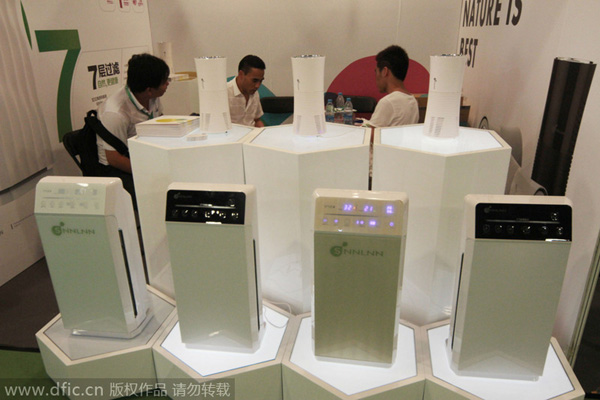 |
|
Air purifiers display at an expo in Beijing On Sept 11, 2014. [Photo/IC] |
At a recent Internet conference filled with China's technology tycoons, Jack Ma of the mighty Alibaba Group Holding Ltd teased Lei Jun, head of the rapidly rising Xiaomi Corp, by asking why a smartphone matters when the air and water in China are so bad?
So when the Beijing-based Xiaomi, the world's third-largest smartphone maker, unveiled a home air purifier in early December, many saw it as Lei's response to Ma.
The gadget, which can be remotely controlled via a smartphone application, is able to clean as as much as 406 cubic meters of polluted air in an hour, but more significantly, it is priced at 899 yuan ($144) when rival products with similar capacities sold by global players such as Blueair AB and Sharp Corp, retail at more than 4,000 yuan.
In fact, Xiaomi is just the latest of the China's tech companies to join the fight against the country's poor air quality.
Air purifiers are becoming a must-have home appliance in Beijing and other cities in northern China, where the smog endangers people's health.
Besides Xiaomi, browser company Cheetah Mobile Inc also launched a 998-yuan smart air purifier that can give users real-time updates of the air pollution levels in their homes, while Chinese security software company Qihoo 360 and consumer electronics enterprise TCL have jointly launched an air purifier priced at 1,440 yuan.
Ma Jihua, an independent information technology expert, said that the reason for tech companies moving into the air purifier sector is simple: "It is potentially a huge market, as an increasing number of people want to breathe clean air. More importantly, for tech companies that want to expand into the smart home sector and create a series of next-generation household appliances, there is no better entry product than an air purifier."
"There are well-established brands in the traditional home appliances sector, such as fridges and air conditioners, but air purifiers are an emerging sector in China, and it is still possible for newcomers to make breakthroughs to become dominant players," said Ma.
Most of the tech companies are targeting the mid- to low-end market, with prices no more than 1,500 yuan. "The pricing strategy is very attractive for some young potential buyers. Moreover, tech companies have strong online distribution channels, which can become their edge to compete with the existing products launched by traditional air purifier makers," said Xu Yanguang, an analyst with the Beijing-based home appliance consultancy All View Consulting Ltd.
Xu, who specializes in the air conditioner and air purifier sectors, said that the disadvantage for these tech companies lies in their lack of core technology in cleaning air.
Kong Zhiqiang, vice-president of Amazon China, said at a recent press conference in Beijing: "Our sales numbers suggest that people tend to buy high-priced air purifiers because they believe higher prices mean a better product."
Amazon China has set up a vertical website dedicated to selling anti-pollution products, and Kong said the sales of health-related products are expected to grow rapidly in 2015.
"Sales of air purifiers jumped 50 percent year-on-year in November. And the sales of masks surged 336 percent quarter-on-quarter in the same period," said Kong.
He expects more money will be spent on health-related products in the coming years, as people are increasingly concerned about the health risks from air and water pollution.
